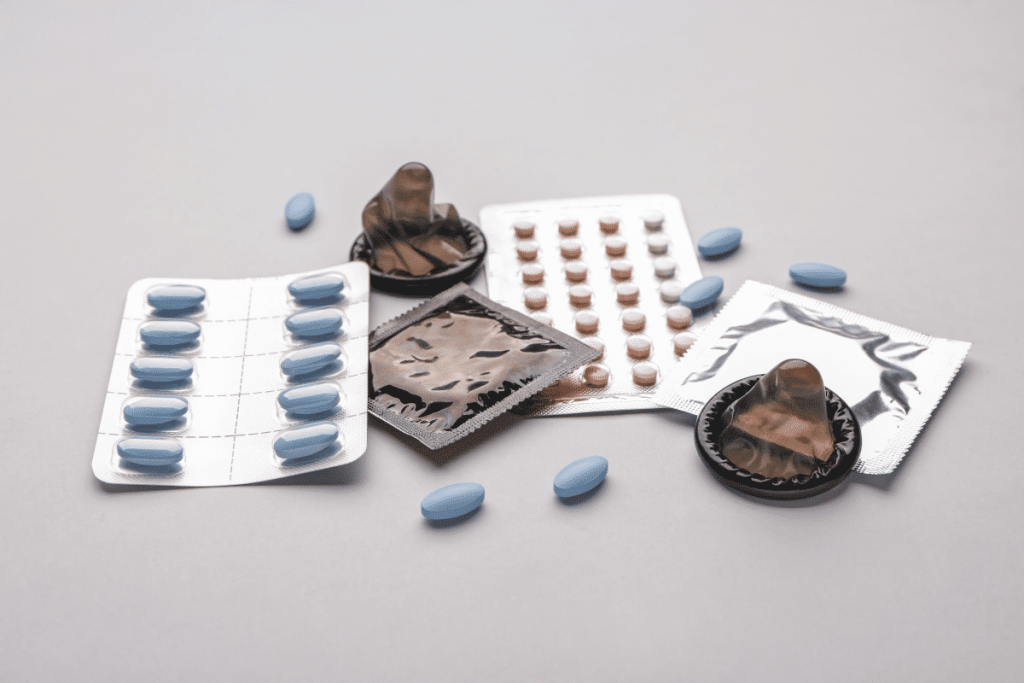Nowadays, there are many ways to prevent HIV infection. The best ways to prevent HIV is to remain abstinent not have sex at all, or ever share needles. Other options to lower the risk of HIV infection include wearing condoms and taking pre-exposure prophylaxis (PrEP) or post-exposure prophylaxis (PEP) as appropriate.
Condoms prevent HIV
Since HIV is a sexually transmitted infection, the best way to prevent HIV is to lower the risk of getting it by using condoms. Condoms are the most effective way to prevent HIV and other sexually transmitted infections (STIs) such as herpes, syphilis, gonorrhea, chlamydia, Hepatitis B, and Hepatitis C. Make sure to put on a condom before any penetration because a man does not need to ejaculate to give or get STIs. Condoms can also prevent pregnancy.
Pre-exposure prophylaxis (PrEP)
PrEP is medicine that people can take to prevent getting HIV from sex without condoms or drug use by injection. When taken as prescribed, PrEP is highly effective for preventing HIV. However, PrEP can only prevent HIV and it does not protect you from other diseases or infections. Condoms remain the better option for thorough protection.
Post-exposure prophylaxis (PEP)
People who have experience possible exposures to HIV (for example, having an unprotected sex with someone who may have HIV) may take post-exposure prophylaxis (PEP) medicine to prevent HIV infection afterward. PEP only be used for emergencies and it must be started within 72 hours after a new possible exposure to HIV.
Regular testing and using treatment to prevent hiv
By regularly getting tested for HIV infection, you can protect yourself and your sexual partners. If you are living with HIV, taking HIV medication as prescribed can significantly lower the risk of your partner becoming infected with the virus. If your viral load (the amount of HIV copies in your blood) remains low and stays undetectable, you will not risk transmitting HIV to anyone.
Avoid drugs and alcohol
Drug and alcohol addiction may increase the risk of HIV infection because it may lower people’s inhibitions and thus they are more likely to engage in reckless behaviors such as sharing needles when injecting drugs. If you do use needles to inject drugs, make sure it’s sterile and do not share them with anyone. Getting treatment for drug addictions can also help further down the risks of HIV infection.
Is there a cure for HIV?
There is no cure for HIV. For now, at least. The current available treatment with antiretroviral therapy may control HIV spread within the body. Those who are living with HIV may live a long and healthy life. If the said person takes the medicine as prescribed. The number of HIV copies within their body, also known as viral load. Will be undetectable and not only it will guarantee the person’s well-being. It can also protect their partners from infection.
In social media such as Twitter and Instagram, several influencers. Who are composed of people living with HIV are starting to use the hashtag U=U. Undetectable = Untransmittable, which is to encourage people to be more aware of the effectiveness of HIV treatment.
Researchers and scientists believe that the cure for HIV will be found. In the past, HIV treatment was limited to only managing the symptoms. Nowadays there are other options such as PrEP and PEP that previously were not available. There are currently clinical trials for HIV vaccines with various stages—something that was not even developed in the past.
For now, the best thing a person can do is get tested regularly for HIV and if the said person does get infected, they should start treatment right away as prescribed.

